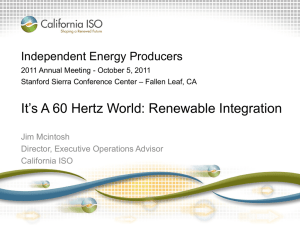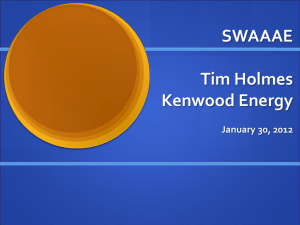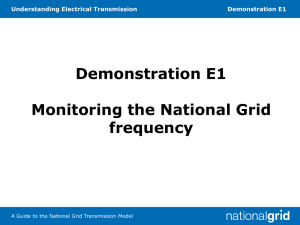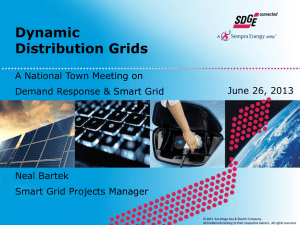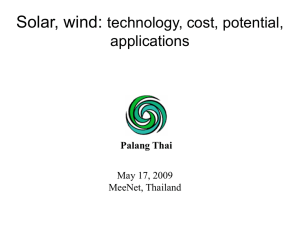PPT - Clean Coalition
advertisement
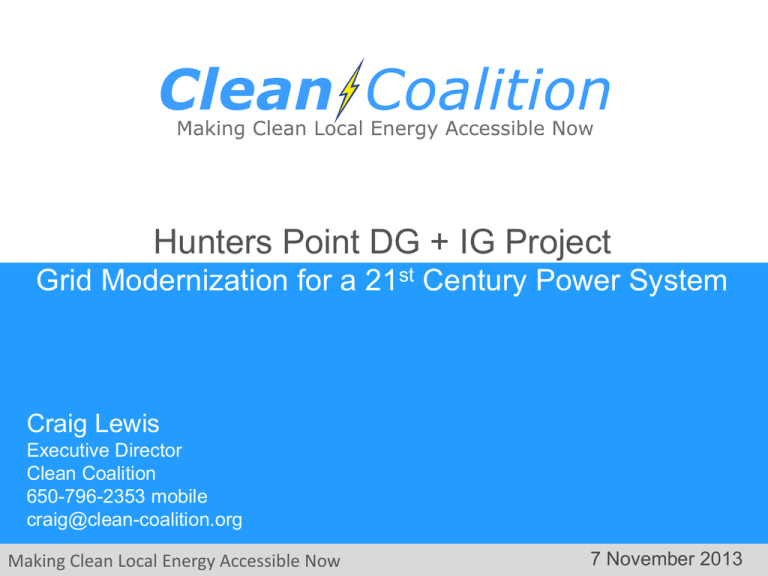
Hunters Point DG + IG Project Grid Modernization for a 21st Century Power System Craig Lewis Executive Director Clean Coalition 650-796-2353 mobile craig@clean-coalition.org Making Clean Local Energy Accessible Now 7 November 2013 Clean Coalition – Mission and Advisors Mission To accelerate the transition to local energy systems through innovative policies and programs that deliver cost-effective renewable energy, strengthen local economies, foster environmental sustainability, and provide energy resilience Board of Advisors Jeff Anderson Eric Gimon Co-founder and Former ED, Clean Economy Network Independent Energy Expert Josh Becker General Partner and Co-founder, New Cycle Capital Patricia Glaza Principal, Arsenal Venture Partners Mark Z. Jacobson Pat Burt CEO, Palo Alto Tech Group; Councilman & Former Mayor, City of Palo Alto Jeff Brothers CEO, Sol Orchard Jeffrey Byron Vice Chairman National Board of Directors, Cleantech Open; Former Commissioner, CEC Rick DeGolia Director of the Atmosphere/Energy Program & Professor of Civil and Environmental Engineering, Stanford University Dan Kammen Director of the Renewable and Appropriate Energy Laboratory at UC Berkeley; Former Chief Technical Specialist for RE & EE, World Bank L. Hunter Lovins President, Natural Capitalism Solutions Ramamoorthy Ramesh Founding Director, DOE SunShot Initiative Governor Bill Ritter Director, Colorado State University’s Center for the New Energy Economy, and Former Colorado Governor Terry Tamminen Former Secretary of the California EPA and Special Advisor to CA Governor Arnold Schwarzenegger Jim Weldon Fred Keeley Technology Executive Treasurer, Santa Cruz County, and Former Speaker pro Tempore of the California State Assembly R. James Woolsey Senior Business Advisor, InVisM, Inc. Felix Kramer John Geesman Founder, California Cars Initiative Former Commissioner, CEC Amory B. Lovins Chairman and Chief Scientist, Rocky Mountain Institute Making Clean Local Energy Accessible Now Chairman, Foundation for the Defense of Democracies; Former Director of Central Intelligence (1993-1995) Kurt Yeager Vice Chairman, Galvin Electricity Initiative; Former CEO, Electric Power Research Institute 2 Distributed Generation + Intelligent Grid Making Clean Local Energy Accessible Now 3 Plan for Renewables Everywhere within D-grid Project Size Central Generation Serves Remote Loads Wholesale DG Serves Local Loads Retail DG Serves Onsite Loads Behind the Meter Distribution Grid Making Clean Local Energy Accessible Now Transmission Grid 4 WDG Delivers Scale & Cost-Effectiveness Fast Solar Markets: Germany vs California (RPS + CSI + other) 35,000 Cumulative MW 30,000 25,000 20,000 California Germany 15,000 10,000 5,000 2002 2006 2007 2008 2009 2010 2011 2012 Sources: CPUC, CEC, SEIA and German equivalents. Germany has deployed 12 times more solar than California in the last decade despite California’s 70% better solar resource!!! Making Clean Local Energy Accessible Now 5 German Solar Pricing Translates to 5 cents/kWh Project Size Euros/kWh USD/kWh California Effective Rate $/kWh Under 10 kW 0.145 0.1903 0.0762 10 kW to 40 kW 0.138 0.1805 0.0722 40.1 kW to 1 MW 0.123 0.161 0.0644 1.1 MW to 10 MW 0.101 0.1317 0.0527 Source: http://www.wind-works.org/cms/index.php?id=92, 10 September 2013 Conversion rate for Euros to Dollars is €1:$1.309 California’s effective rate is reduced 40% due to tax incentives and then an additional 33% due to the superior solar resource Replicating German scale and efficiencies would yield rooftop solar at only between 5 and 7 cents/kWh to California ratepayers Making Clean Local Energy Accessible Now 6 DG+IG Initiative = Proving Feasibility of High DG Work with five utilities across the US to deploy a DG+IG demonstration project at each by yearend-2015 Prove viability of Distributed Generation (DG) providing at least 25% of total electric energy consumed within a single substation grid area Integrate Intelligent Grid (IG) solutions to ensure that grid reliability is maintained or improved from original level IG solutions include diversity and Energy Storage for sure, and potentially, advanced inverters, forecasting & curtailment, and/or Demand Response Making Clean Local Energy Accessible Now 7 Benefits of DG+IG and Community Microgrids Power Quality, Reliability & Resilience benefits Increased customer satisfaction Improved equipment longevity Sustained vital services in otherwise complete blackout scenarios Avoided transmission & central generation vulnerabilities Economic benefits Significant private-sector investment Substantial local job creation Fixed electricity prices for 20+ years Localized energy spending Avoided inefficiencies of central generation & transmission Environmental benefits Avoiding dirty power generation, including nasty peaker plants that are often sited in underserved communities Utilizing built-environments and disturbed lands for generation projects Preserving pristine environments from transmission lines and other infrastructure Making Clean Local Energy Accessible Now 8 Bayview-Hunters Point (BHP) Background • BHP has a long history of environmental degradation. • Houses one third of San Francisco’s hazardous waste sites. • Was site of California's dirtiest peaker power plant until community activism forced its closure in 2010. • 20% of BHP children suffer from asthma, and other chronic illnesses, 4 times CA average • BHP has one of the highest poverty rates in San Francisco, with 30% of families earning less that $10,000 per year, and a median household income of $29,640 annually, as compared to $65,000 for white San Franciscans and a $55,221 average citywide. • An overwhelming 72% of the African Americans in BHP have incomes below the federal poverty level. Sources: Hunters Point Family and Grid Alternatives. Making Clean Local Energy Accessible Now 9 Hunters Point Project Scope & Deliverables Identify prospective sites and components for DG+IG solutions throughout Bayview-Hunters Point (BHP), including PV, biogas, wind, storage, demand response, and advanced inverters Model and simulate existing grid characteristics Model and simulate DG+IG scenarios that maintain or improve grid power quality, reliability, and resilience Recommend the optimum DG+IG scenario that best balances system cost & performance considerations Quantify the benefits of the recommended DG+IG scenario in terms of economics, environment, and grid efficiency & performance Design streamlined procurement & interconnection procedures Secure approvals for full DG+IG deployment Deploy!!! Making Clean Local Energy Accessible Now 10 New Construction vs Retrofit Comparison Hunters Point Substation serves Major Redevelopment Area & Continuing Urban Neighborhoods (about 40/60 split) Making Clean Local Energy Accessible Now 11 Hunters Point Project Goals Get at least 25% of the electric energy consumed within the Hunters Point substation area (Bayview-Hunters Point) coming from local renewables Deliver a proven model for maximizing local renewables under San Francisco’s 2020 goal to be 100% powered by renewables Achieve about $250 million dollars of private investment in BayviewHunters Point with about a third going to local wages Reduce annual greenhouse gas emissions by at least 50M pounds Serve as a model for clean local energy that can easily be scaled and replicated across the globe Provide a compelling business case for Community Microgrids that inspires cities and communities everywhere to implement Distributed Generation + Intelligent Grid (DG+IG) projects Making Clean Local Energy Accessible Now 12 Starting Point: BHP Total Load Hunters Point Total Average Load: 328,217 MWh = 37.5 MW(ac) • Existing conventional: 236,520 MWh = 27 MW(ac) • Existing DG (PV+Biopower): 13,338 MWh = 1.5 MW(ac) • Planned for Redev Zone: 78,359 MWh = 8.9 MW(ac) PG&E Load – Existing PG&E Average Load Calculation • • • kW average = kWHr / Hrs kW average = kW peak x PG&E Load Factor. DART has different LFs for each customer type. kW peak and load factors provided by PG&E Feeder SF P 1101 SF P 1102 SF P 1103 SF P 1104 SF P 1105 SF P 1106 SF P 1107 SF P 1108 SF P 1109 Totals: Summer KVA Winter KVA KVA Lds fm LF KVA Lds fm LF 3,428 3,193 4,383 5,062 2,518 2,947 325 451 4,679 4,685 1,836 1,769 4,238 4,616 2,167 2,849 2,433 2,242 26,008 27,815 NOTE: For all slides, average load is in MW (dc), total load is in MWh (ac) – except where noted; e.g. where average load represents conventional rather than renewable resources. Making Clean Local Energy Accessible Now 13 Next: BHP DG Potential = 50MW New PV Bayview/Hunters Point DG Potential: 95,194 MWh = 60.6 MW = 30% of Total Load • New PV: 52.1 MW • Existing DG: 8.5 MW (PV equivalent) Type Avg. Load (MW) Total Load (MWHr) New PV: Commercial 11.0 17,333 New PV: Residential 18.0 28,275 New PV: Parking Lots 2.6 4,102 New PV: Redev Zone 20.5 32,146 Total New PV 52.1 MW 81,856 Existing PV Equiv. 8.5 13,338 Total DG Potential: 60.6 95,194 Making Clean Local Energy Accessible Now 14 BHP DG Potential: Commercial Potential PV: Commercial Rooftops Highlights: • Number of visually-sited highest value “A” sites = 34 • Total PV-potential rooftop square feet = 1.4M • Total participating sq. ft. @ 50% = 736K • Total average generation, participating rooftops = 11 MW Hunters Point Rooftops - Commercial Assumptions Watts/sq. ft. PV hrs./yr. Participation Factor 15 1570 50% Results Total Sq. Ft. Total Sq. Ft. Participating Total Watts Participating Total PV in MW Total PV in Annual MWhr Average kW per site 1,472,000 736,000 11,040,000 11.0 17,333 649 Making Clean Local Energy Accessible Now Example: 180 Napolean St. • PV Sq. Ft = 47,600 • System size = 714 kW 15 BHP DG Potential: Parking Lots Potential PV: Parking Lots Highlights: • Number of visually-sited highest value “A” sites = 13 • Total PV-potential parking lot square feet = 348K • Total participating sq. ft. @ 50% = 174K • Total average generation, participating parking lots = 2.6 MW Hunters Point Parking Lots Assumptions Watts/sq. ft. PV hrs./yr. Participation Factor 15 1,570 50% Results Total Sq. Ft. Total Sq. Ft Participating Total Watts Participating Total PV in MW Total PV in Annaul MWh Average kW per site 348,400 174,200 2,613,000 2.6 4,102 402 Making Clean Local Energy Accessible Now Example: 1485 Bay Shore Blvd • PV Sq. Ft = 37,800 • System size = 567 kW 16 BHP DG Potential: Residential Potential PV: Residential Rooftops Highlights: • Total residential sites = 14,000 • Average PV-viable square feet per residence (from 50 sites) = 343 • Total PV-potential residential square feet = 4.8M • Total participating sq. ft. @ 25% = 1.2M • Total average generation, participating rooftops = 18 MW Hunters Point Rooftops - Residential Assumptions Watts/sq. ft. PV hrs./yr. Participation Factor 15 1570 25% Results Total HH Average PV-viable sq. ft. per HH Total PV-viable Sq. Ft. Total PV-viable Sq. Ft. Participating Total PV in Watts Total PV in MW Total PV in Annual MWh Average PV system size per HH, kW 14,000 343 4,802,560 1,200,640 18,009,600 18.0 28,275 5 Making Clean Local Energy Accessible Now Example: 50 average rooftops • Average PV Sq. Ft = 343 • Average system size = 5 kW 17 BHP DG Potential: Redev Zone Potential PV: Redev Zone Highlights – total planned load of 78,359 MWh/yr: • Total planned rooftop square feet in HP = 4.2M • Total rooftop square feet in HP = 2.73M • Total participating sq. ft. @ 50% = 1.365M • Total average generation, participating rooftops = 20.5 MW Hunters Point Rooftops – Redev Zone Assumptions Watts/sq. ft. PV hrs./yr. HP % of Redev Zone Participation Factor 15 1570 65% 50% Results Total Planned Rooftop Sq. Ft. Total Rooftop Sq. Ft. in HP Substation Total PV-usable Sq. Ft. Participating Total PV in Watts Total PV in MW Total PV in annual MWh 4,200,000 2,730,000 1,365,000 20,475,000 20.5 32,146 Making Clean Local Energy Accessible Now 18 Benefits of 50 MW New DG in BHP ~$250M in Private Investment Over 20 Years Delivers These Regional Ben Photo courtesy of GRID Alternatives Economic Energy $233M $244M total regional economic output 1,560 Job Years local energy spend vs. imported over 20 years near-term regional employment $79.7M 590 Job Years avoided transmission costs over 20 years ongoing regional employment Lower cost vs. natural gas $85M 14.9¢/kWh solar vs. $15.3¢/kWh CCNG LCOE local wages in construction & installation $6.75M state/local construction-related sales taxes Environment 82M lbs. annual reductions in GHG emissions 15M Gallons 19 Source: NREL Local JEDI calculator. Based on average of $3.25/W(ac) taxes & incentives using PG&E Making Clean Energy Accessible Nowinstalled costannual water before savings Peek of the Future at Hunters Point Making Clean Local Energy Accessible Now 20 Back-Up Slides Back-Up Slides Making Clean Local Energy Accessible Now 21 Example DG+IG Grid Stabilization 1. 6AM: • no PV impact 2. Noon: • 20MW PV causes overvoltage without DG+IG 3. Noon: • DG+IG stabilizes voltage impact from 20MW PV Making Clean Local Energy Accessible Now 22 Advanced Inverters – Reactive Power Champion REACTIVE (Q) P: Real power (kW) Q: Reactive power (kVAr) S: Total power (kVA) S 110% Q 45.8% REAL (P) P 100% 100 kW solar PV AC power 110 kVA inverter capacity 0.9 power factor 45.8 kVAr reactive power 100 kW real power Oversized inverter: • No reduction of PV real power • Draws up to 10 kW real power from the grid • Provides reactive power 24/7/365 Making Clean Local Energy Accessible Now 23 Example DG+IG Grid Stabilization 1. 6AM: • no PV impact 2. Noon: • 20MW PV causes overvoltage without DG+IG 3. Noon: • DG+IG stabilizes voltage impact from 20MW PV Making Clean Local Energy Accessible Now 24 Distributed Voltage Regulation – Location Matters “The old adage is that reactive power does not travel well.” Oak Ridge National Laboratory (2008) T&D lines absorb 820x more reactive power than real power. Prevent Blackouts: When a transmission path is lost, remaining lines are heavily loaded and losses are higher. Source: Oak Ridge National Laboratory (2008) Making Clean Local Energy Accessible Now 25 Replacing SONGS with DG+IG vs Huntington Beach 290 MVars (minus line losses = 261 MVars) 570 MW of local solar with advanced inverters, oversized by 10% set at 0.9 Power Factor = 261 MVArs Local solar configured with advanced inverters alone can replace SONGS Making Clean Local Energy Accessible Now 26 Replace SONGS – Energy Storage Potential Targets proposed by CPUC include 745 MW storage in Southern California Making Clean Local Energy Accessible Now 27 PV Potential of Top 25 Roofs in LA is Over 75 MW Rank 1 2 3 4 5 6 7 8 9 10 11 12 13 14 15 16 17 18 19 20 21 22 23 24 25 Potential Size (kW) 6,987 6,296 4,797 4,524 4,402 3,771 3,629 3,597 3,596 3,366 3,351 3,313 3,052 2,806 2,703 2,693 2,673 2,672 2,431 2,430 2,404 2,201 2,171 2,149 2,126 Address 300 WESTMONT DR 3880 N MISSION RD 400 WESTMONT DR 20525 NORDHOFF ST 2501 S ALAMEDA ST 4544 COLORADO BLVD 1800 N MAIN ST 5500 CANOGA AVE 20333 NORMANDIE AVE 8500 BALBOA BLVD 6600 TOPANGA CANYON BLVD 401 WESTMONT DR 9301 TAMPA AVE 11428 SHERMAN WAY 3820 UNION PACIFIC AVE 1601 E OLYMPIC BLVD 9120 MASON AVE 12745 ARROYO ST 5525 W IMPERIAL HWY 8201 WOODLEY AVE 8900 DE SOTO AVE 3410 N SAN FERNANDO RD 12820 PIERCE ST 4024 RADFORD AVE 3020 E WASHINGTON BLVD Description Warehousing, Distribution, Storage Warehousing, Distribution, Storage Warehousing, Distribution, Storage Lgt Manf.Sm. EQPT. Manuf Sm.Shps Instr.Manuf. Prnt Plnts Warehousing, Distribution, Storage Lgt Manf.Sm. EQPT. Manuf Sm.Shps Instr.Manuf. Prnt Plnts Warehousing, Distribution, Storage Heavy Manufacturing Food Processing Plants Heavy Manufacturing Shopping Centers (Regional) Warehousing, Distribution, Storage Shopping Centers (Regional) Warehousing, Distribution, Storage Heavy Manufacturing Warehousing, Distribution, Storage Lgt Manf.Sm. EQPT. Manuf Sm.Shps Instr.Manuf. Prnt Plnts Lgt Manf.Sm. EQPT. Manuf Sm.Shps Instr.Manuf. Prnt Plnts Heavy Manufacturing Lgt Manf.Sm. EQPT. Manuf Sm.Shps Instr.Manuf. Prnt Plnts Heavy Manufacturing Lgt Manf.Sm. EQPT. Manuf Sm.Shps Instr.Manuf. Prnt Plnts Warehousing, Distribution, Storage Motion Picture, Radio & Television Heavy Manufacturing 100+ GW of Built-Environment Solar Potential in California vs 60 GW of Peak Load Making Clean Local Energy Accessible Now 28 Renewables are Reliable Country Percent of electrical generation in 2007 from non-hydro renewables 2007 SAIDI – outage duration (minutes) 2007 SAIFI – outage frequency (number of outage events) Denmark 29.4% 23 0.5 Germany 12% 24 0.5 United States 2.8% 240 1.5 Sources: Galvin Electricity Initiative, Electric Reliability: Problems, Progress and Policy Solutions, February 2011 U.S. Energy Information Administration, International Energy Statistics, 2011 Making Clean Local Energy Accessible Now 29 DG+IG Core Solutions for Voltage Regulation Solutions Distributed Generation Benefits • Provisions reactive power where it’s needed most for regulation • Avoids line losses • Reduces congestion of transmission and distribution lines Advanced Inverters (paired with solar, storage) • Provisions distributed reactive power • Reacts automatically within fractions of a second (conventional resources can take minutes to react) • Converts real power from the grid to reactive power 24/7/365 • Oversized inverters can deliver reactive power without reducing DG real power output • Ride-through voltage events, remain attached longer than conventional spinning generators without harm • Modern inverters already have these advanced capabilities Energy Storage (batteries, flywheel) • Provisions both real and reactive power • Generally paired with advanced inverters Making Clean Local Energy Accessible Now 30 DG+IG Solutions for Balancing Power & Frequency Solutions Demand Response Energy Storage (batteries, flywheel) Forecasting Benefits • Automated demand response can address power imbalances within fractions of a second • Reduces or shift load away from peak hours to free up other resources to provide real power • Supplies and absorbs power • Can reduce or shift load • Can react automatically within fractions of a second • Forecasting improvements will reduce unpredicted differences between scheduled supply and actual supply Curtailment (proactive • Reduce output from intermittent generators for proactive ramp ramp control) control to smooth out short term impulse Making Clean Local Energy Accessible Now 31 DG+IG Keeps Power in Balance DR, ES shifts load ES, Auto-DR, curtail for steep ramp DR, ES shifts load Making Clean Local Energy Accessible Now 32 DG+IG Projects Begin with Grid Modeling & Simulation Making Clean Local Energy Accessible Now 33 DG+IG Policy Innovations Required Integrate Grid Planning Transparent and public T&D planning processes Proactively evaluate DG+IG alternatives to new transmission investments Necessary to meet goals re: renewables, EVs, costs, local job creation, resilience Implement Full Cost & Value Accounting Investments should reflect the full spectrum of rate impacts, economic growth, health, safety, and environmental sustainability Prevent bias against DG+IG (e.g. hidden transmission costs) Monetize DG+IG Grid Services Establishing markets that compensate at full value of grid services is fundamental to optimizing value for ratepayers Prioritize DG+IG Development in High Value Locations Identify preferred locations on the grid based on transparent cost & value criteria Set “Local Portfolio Standard” targets Update Technical Standards: Update national technical standards (IEEE/ UL) to allow DG+IG to provide grid services to the fullest potential Making Clean Local Energy Accessible Now 34 Clean Coalition Overarching Objectives From 2020 onward, at least 50% of all new electricity generation in the United States will be from local sources. Locally generated electricity does not travel over high voltage transmission lines to get from the location it is generated to the area it is consumed. From 2020 onward, at least 80% of all new electricity generation in the United States will be from renewable sources. By 2020, policies and programs are well established for ensuring successful fulfillment of the other two objectives. Policies reflect the full value of local renewable energy. Programs prove the superiority of local energy systems in terms of economics, environment, and resilience. Making Clean Local Energy Accessible Now 35 Clean Coalition Activities in 2013 Policy: Implement policy innovations that remove barriers and open market opportunities for Distributed Generation (DG) and Intelligent Grid (IG) solutions Key victories: SB 43, AB 327 and positioning of Advanced Inverter as key reactive power solution Wholesale DG Programs: Establish and expand market opportunities for WDG across the country Key victories: Georgia Power, Los Angeles, Long Island, Palo Alto, Fort Collins, and Sacramento DG+IG: Stage five DG+IG demonstration projects for online by yearend-2015 Key progress: Hunters Point (PG&E), Virgin Islands (WAPA), Palo Alto, and Los Angeles Solar Developers Council: Open markets & remove barriers for members Key progress: Multiple new WDG programs established and key policy victories Communications: Increase impact and frequency of communications Key progress: Three key communications pieces per month plus heavy blogging, rapid response, and social media activities. New concepts like Advanced Inverters. Making Clean Local Energy Accessible Now 36 Hunters Point Solar Scale:LCOE Cost Benefit is less than CCNG $/MWh NATURAL GAS SOLAR 500 kW Solar achieves lower LCOE than new natural gas generation – Hunters Point average expected commercial size = 650 kW Total Costs $250 Variable Costs $200 Fixed Costs 550 MW CCNG Annual Fixed and Variable Power Plant Costs $/MWh $150 Busbar wholesale cost from plant 2015: $11.7 ¢/kWh 2024: $17.1 ¢/kWh 2034: $21.7 ¢/kWh $100 $50 LCEO: $15.4 ¢/kWh $0 2015 2016 2017 2018 2019 2020 2021 2022 2023 2024 2025 2026 2027 2028 2029 2030 2031 2032 2033 2034 Year Source: CEC, 2010 Making Clean Local Energy Accessible Now 37 Zero Net Energy is Key Driver for Smart Buildings Making Clean Local Energy Accessible Now 38 Adoption Cycle: Demos, Certs, Standards & Codes Making Clean Local Energy Accessible Now 39 Buildings of 2030 Must Fit with Cities of Future Making Clean Local Energy Accessible Now 40 Expect EV Chargers Everywhere EVs provide the CLEAN Bridge between Energy, Buildings, Cities and Transportation Making Clean Local Energy Accessible Now 41 German Solar Capacity is Small WDG (Rooftops) German Solar PV Capacity Installed in 2010 26% 2,000 23.25% 1,800 22.5% 19% 1,600 1,400 MW 1,200 1,000 800 9.25% 600 400 200 up to 10 kW 10 to 30 kW 30 to 100 kW 100 kW to 1 MW over 1 MW Source: Paul Gipe, March 2011 Germany’s solar deployments are almost entirely sub-2 MW projects on builtenvironments and interconnected to the distribution grid (not behind-the-meter) Making Clean Local Energy Accessible Now 42 US has Far Better Solar Resource than Germany Making Clean Local Energy Accessible Now 43 WDG is Key Market Segment with Superior Value Total Ratepayer Cost of Solar Distribution Grid T-Grid PV Project 100kW size and type roof 500kW roof 1 MW roof 1 MW ground 5 MW ground 50 MW ground Required PPA Rate 16¢ 15¢ 13¢ 9-11¢ 8-10¢ 7-9¢ T&D costs 0¢ 0¢ 0¢ 0¢ 0¢ 2-4¢ Ratepayer cost per kWh 16¢ 15¢ 13¢ 9-11¢ 8-10¢ 9-13¢ Sources: CAISO, CEC, and Clean Coalition, Nov2012; see full original analysis from Jul2011 at www.clean-coalition.org/studies The most cost-effective solar is large WDG, not central station due to significant hidden T&D costs Making Clean Local Energy Accessible Now 44 Deployment Volume Drives Learning Curves Solar pricing is reduced by 20% for every doubling of deployed volume New technology learning curve Si learning curve Efficiency innovation Making Clean Local Energy Accessible Now 45
